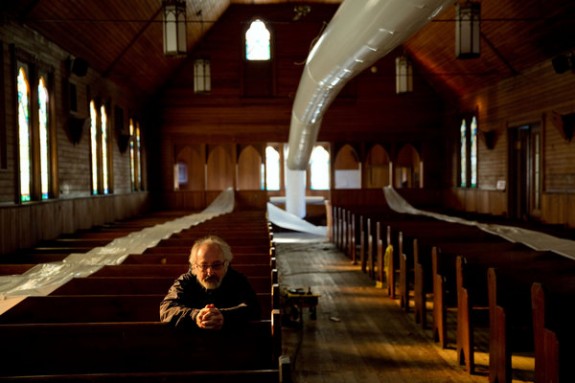From the New York Times, a rare look at how churches and congregations are also suddenly homeless because of Hurricane Sandy:
Across the vast region hit by Hurricane Sandy, dozens of houses of worship are dealing with an extraordinary circumstance. Normally, their clergy members and lay leaders would be spending these weeks occupied with the urgent mission of feeding and caring for congregants hurt by the storm. But leaders of congregations whose buildings were flooded, damaged or destroyed are finding themselves in the emotionally difficult position of having to ask for help themselves.
In the Rockaways section of Queens, Rabbi Marjorie Slome visits her Reform Jewish congregation, West End Temple, each day to see what she can salvage. All of the prayer books and Torah commentaries were ruined when flooding filled the basement and reached up to four feet on the first floor. The sanctuary, offices and social hall were covered in inches of muck.
“I fully expected to come in here on Tuesday and open up my temple to serve the community and let it be a food distribution place,” she said. “And we couldn’t. Instead, I’m going around telling volunteers helping us, ‘It’s unsanitary: put your mask on; wear your gloves.’ ”
At the Jersey Shore, around eight miles north of Ortley Beach, the Rev. Neil C. Turton, rector of All Saints Church in Bay Head, is trying to pick up the pieces of that church even after losing his own home. The historic wooden church, built by shipbuilders in 1889, was slammed between walls of water from the bay on one side and the ocean on the other. The water crumbled the foundation, Mr. Turton said; there is now a sinkhole in the sanctuary into which the pews are listing at a 30 degree angle. The rectory is uninhabitable; the organ and the church’s records ruined, he said.
In the weeks to come, Mr. Turton thinks that his congregation will temporarily end up moving in with St. Mary’s by the Sea Episcopal Church in Point Pleasant, which was built on higher land. Many congregations are cooperating in similar workarounds. But, he said, “It’s going to take some time.”
One aspect of the storm’s aftermath is how some clergy members are themselves suffering, said Rabbi Daniel Freelander, senior vice president of the Union for Reform Judaism. Some rabbis, he said, had told him they found the week after the storm “one of the most exhausting of their lives.”
Some clergy members remain without power in their own homes, yet they spend their days calling and visiting their congregants, helping them through their losses and isolation. “It’s an emotional overload,” Rabbi Freelander said. “It’s like having 30 funerals in a week.”
















